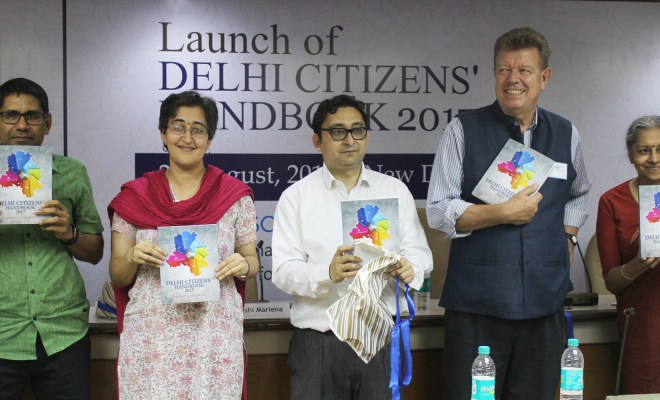Delhi Citizens’ Handbook 2017 released

Team L&M
Centre for Civil Society (CCS), an independent, non-profit, research and educational organisation devoted to improving the quality of life for common people, has come up with the Delhi Citizens’ Handbook 2017.
The handbook is a compilation of research papers on issues of public policy. The research papers assess the impact and relevance of policies that shape the lives of ordinary citizens in the national capital on eight core areas of urban governance viz Administration, Education, Public Healthcare, Water and Sewage, Labour and Employment, Food and Civil Supplies, Public Transport and Women’s Safety, and Housing Infrastructure.
The handbook thus functions as a critical resource for productive public intervention and has been prepared with the aim of ensuring an informed discussion on achieving effective and accountable governance.
The handbook was released by Atishi Marlena, advisor to the Deputy Chief Minister of Delhi Manish Sisodia. After the launch, there was a panel discussion featuring distinguished personalities Anjali Srivastava (Praja), Vikramjit Banerjee (Advocate, Supreme Court) and Prof. Indira Rajaraman (IIM Bangalore) on the theme Good Governance and Development: Performance and Strategic Reforms.
The discussion explored the idea of governance and development, taking from the policy shortcomings addressed in the book. It also brought up the critical questions of how governance and developmental reforms, for instance the recent e-governance initiative, can take place in a country like ours, and what the expected role of governmental and non-governmental institutions will be in this process.
“The book specifically locates and examines the point at which the citizen interacts with the political system, the grievance redressal mechanisms, which are largely dysfunctional at present,” said panelist Anjali Srivastava.
“The crucial task for policymakers is to examine policies from the perspective of the recipients; it is not correct to say that a policy has good intentions but bad implementation, a policy that fails in implementation is a bad policy to begin with,” remarked Atishi Marlena.

